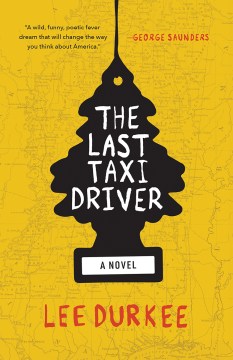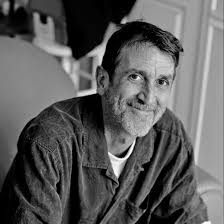Interview by Jana Hoops. Special to the Clarion-Ledger Sunday print edition (March 1)
 Twenty years after his first book Rides of the Midway made its debut, Lee Durkee has returned with his new release The Last Taxi Driver, a one-night study of the life of Lou Bishoff as he takes stock of the things that really matter, while transporting his final passengers to their own destinations.
Twenty years after his first book Rides of the Midway made its debut, Lee Durkee has returned with his new release The Last Taxi Driver, a one-night study of the life of Lou Bishoff as he takes stock of the things that really matter, while transporting his final passengers to their own destinations.
In between his novels, Durkee’s stories and essays have appeared in Harper’s Magazine, the Sun, Best of the Oxford American, Tin House, New England Review, Mississippi Noir, and other publications.
His memoir Stalking Shakespeare, which recounts his 10-year quest to locate lost portraits of William Shakespeare, will be released in 2021.
Born in Hawaii, Durkee grew up in Hattiesburg and lived in Vermont for 18 years (among other places) before moving back to his home state to escape the harsh winters. A former cab driver himself, he now lives in North Mississippi.
I’ll start with the obvious first question: why so long (20 years) between Rides of the Midway, your debut novel, and The Last Taxi Driver, your new release?

Lee Durkee
I have so many answers to this question! Let me explain to you why I failed so spectacularly at publishing for 20 years. My friend Bill at Square Books (in Oxford) used to give me pep talks at the bar at City Grocery in which he emphasized how hard Michael Farris Smith worked, and other well-meaning friends have gently lectured me about drinking or smoking to excess. But I suspect the real reason I never published a second novel was a lack of practicality in what I wrote about.
I don’t have much control over what pours out. My relationship with writing is an opium-like addiction I enjoyed every day for those 20 years of obscurity during which I wrote two unloved books set in Kathmandu as well as a hip-hop version of Hamlet set to Nas’s Stillmatic. I also wrote two books about Elizabethan portraits and a short story collection set in Tokyo told from the point-of-view of nine different Japanese sex dolls. Then there were my Vermont novels, one in which I hideously murdered my real-life jerk of a landlord by having him stuffed, while still screamingly alive, down an ice hole drilled into a frozen lake. None of these books could be described as commercial ventures.
Please tell me about your own experiences as a taxi driver yourself. Did crazy things happen? Were you ever frightened? How did getting that job come about? And, finally, how did that experience influence The Last Taxi Driver?
I drove for two different cab companies in Oxford for a year each and was frequently very frightened. There were times I drove 70-hour weeks–the only way I could eek out a living while saving money for my own car. My first cab company specialized in trailer parks and projects and dirt roads. We also carted the poor people who got kicked out of the local hospital back to their hovels to die. But, as to being afraid, it was mostly the cackles of drunk frat boys who worried me. Like the time I kicked a hoard of them out of my cab for yelling the N-word at this couple. These giant frat boys got out, surrounded my cab, and started kicking the doors etc., while calling me the N word. And I’m white! That’s how racist those punks are. Racists always assume their cab drivers are fellow racists. Same with perverts. The things I heard those kids say about women and Obama would harrow your blood to hear. I drove with a big Kershaw knife under my leg. Other cabbies I worked with had guns.
It was my friend Joyce Freeland, a do-good lawyer, who got me hired by my first cab company after I’d explained to her I couldn’t bartend any more due to back spasms. And the actress Joey Lauren Adams hooked me up with my second cab job. Both Joyce and Joey are members in high standing of the Save Lee from Himself Club, whose president is (Oxford author) Lisa Howorth.
And yes, both taxi jobs influence the novel. Grist was the whole point of me not working in an English department like 98 percent of all writers today do. We live in a world where the bulk of noir fiction is now being written by schoolteachers who have never even had night jobs. They write with their imaginations! Along those lines, the first thing I do whenever I pick up a new book these days is turn it over, trying to deduce if the author has ever stepped outside of an English department.
The Last Taxi Driver is the detailed story of cab driver Lou Bishoff’s last evening on the job, as he shares it in first person, with a penchant for getting off the subject now and again. Despite the state of his personal life (girlfriend problems, his health and his career direction) he always has humor to fall back on, lending a kind of slanted optimism to what many would deem a dire existence. How does Lou, who seems to take things in stride as he reasons through his sometimes-tangled trains of thought, manage to keep it together?
Actually, I’m not sure Lou does keep it together, and his shift-from-hell can certainly be read as a descent into madness. But dark humor must be a survival mechanism, right? I’ve worked in restaurants all my life, and the jokes you hear there are 1,000 times funnier and dirtier than the meticulously censored ones you’ll hear inside English departments. Both my novels are rife with the black humor of servers who have to smile-smile-smile and then walk back into the kitchen and just let loose that venom. I am nothing if not a child of restaurants. They raised me, they sustained me.
How much of Lou Bishoff is Lee Durkee? (They seem to have a lot in common.) What are the differences?
I suppose Lou could be described as a more tragic version of me who exists in a darker dimension–cue Rod Serling. But that’s also true for other characters in The Last Taxi Driver. There are tricks writers play to make you think a book is more autobiographical than it is. We want you to think that. I’ve always been a huge fan of The Things They Carried by Tim O’Brien, which takes the illusion of verisimilitude to a new level–he even named his main character Tim.
But Lou, like all characters in fiction, is mostly a creature of plot. To say Lou is me would be wrong–Lou at least has a girlfriend. And half of Lou’s dialogue was ripped off from customers I’ve eavesdropped on. Like all my characters, Lou is a mutt who is made up of traits culled from a dozen or so different people.
Tell me about your upcoming memoir, set to be released in 2021.
Stalking Shakespeare is a memoir about my decades-long obsession with being the first person to ever find a portrait of Shakespeare painted from life. The memoir is funny, not academic, and concerns my time living in Vermont, Tokyo, London, and my eventual return to Mississippi after 37 years away. I’ve long given up writing anything that isn’t funny.
Signed first editions of The Last Taxi Driver can be found at Lemuria and at our online store.


Comments are closed.